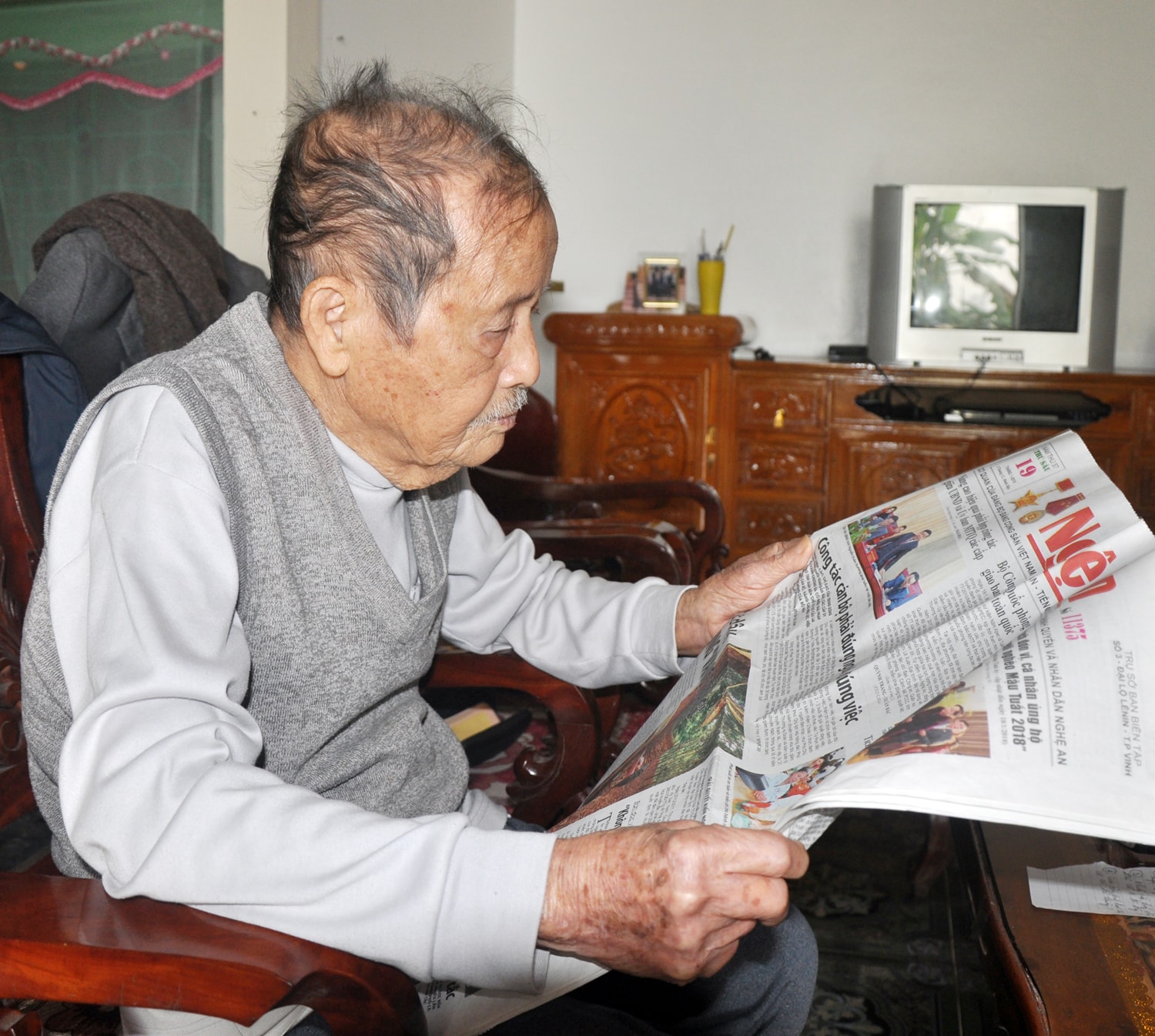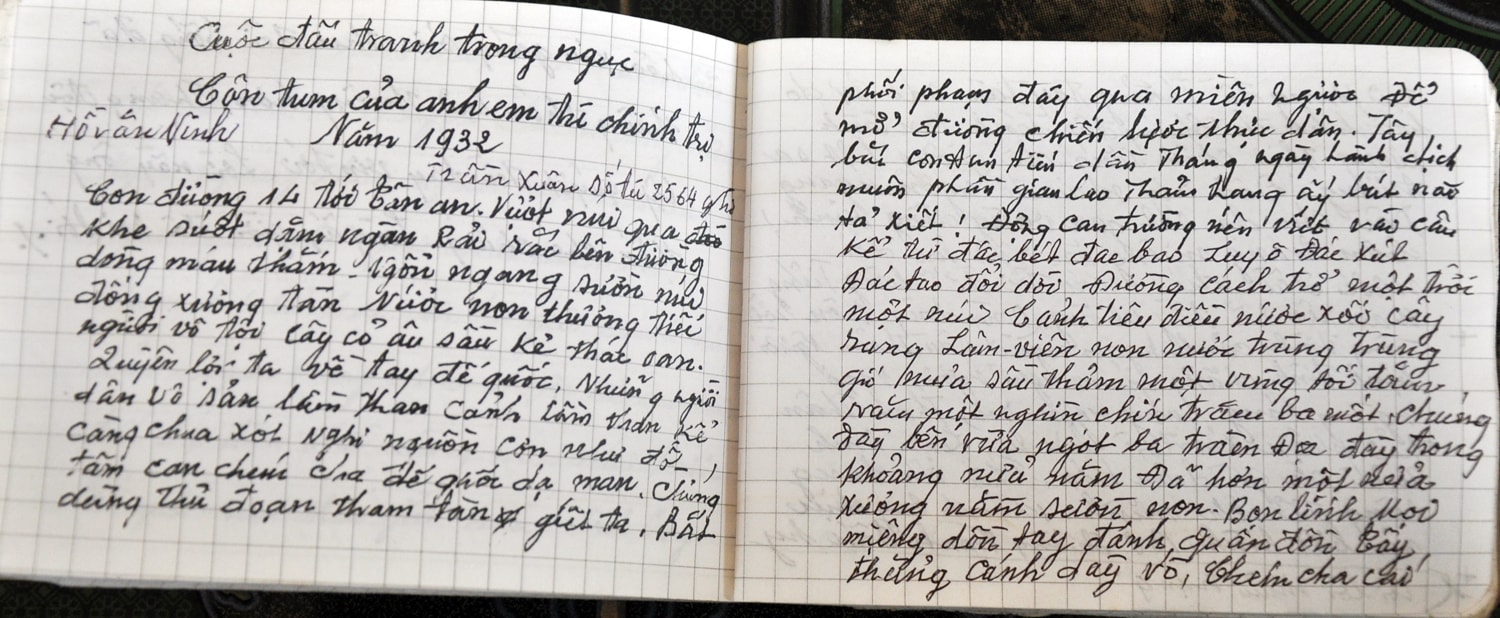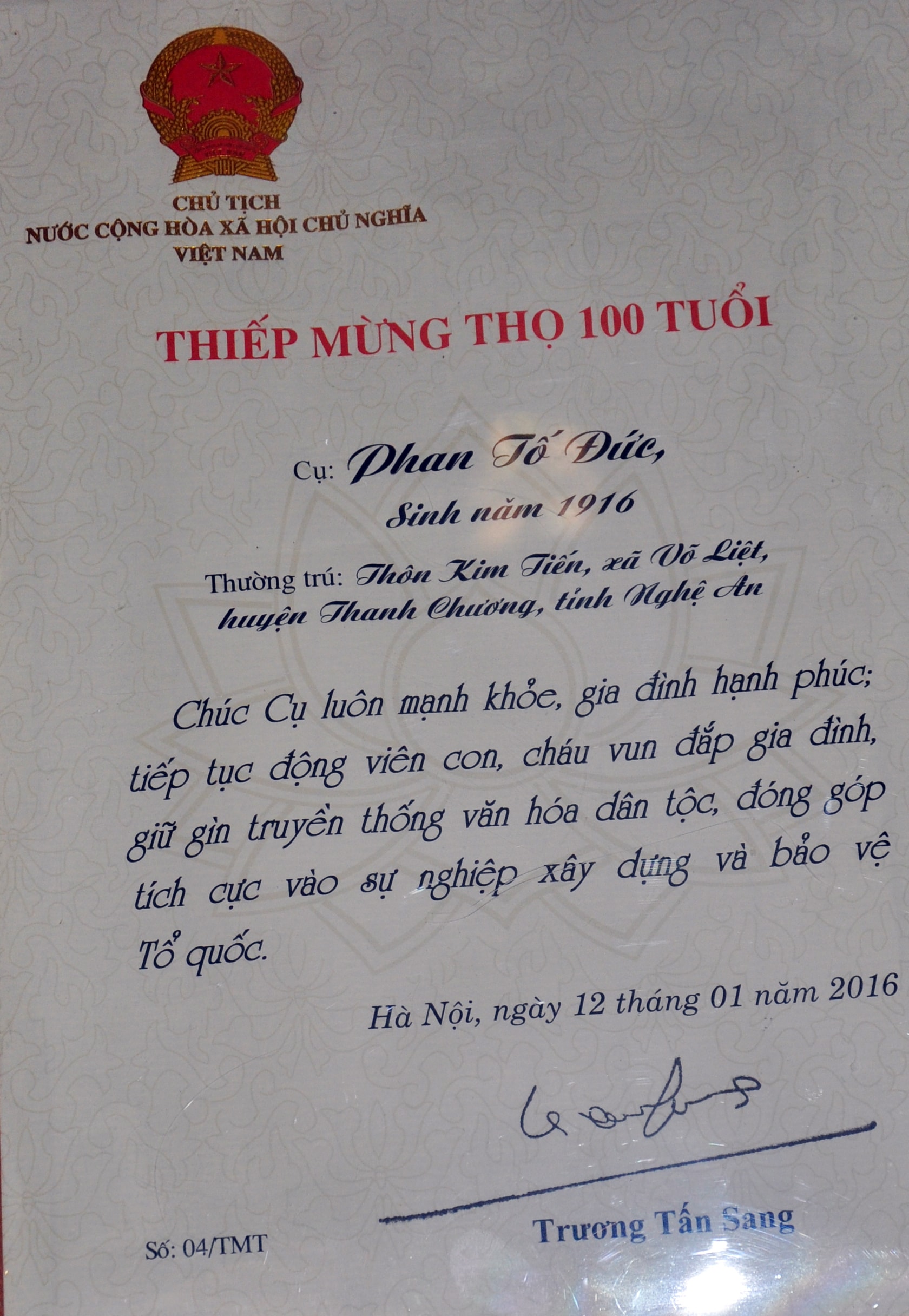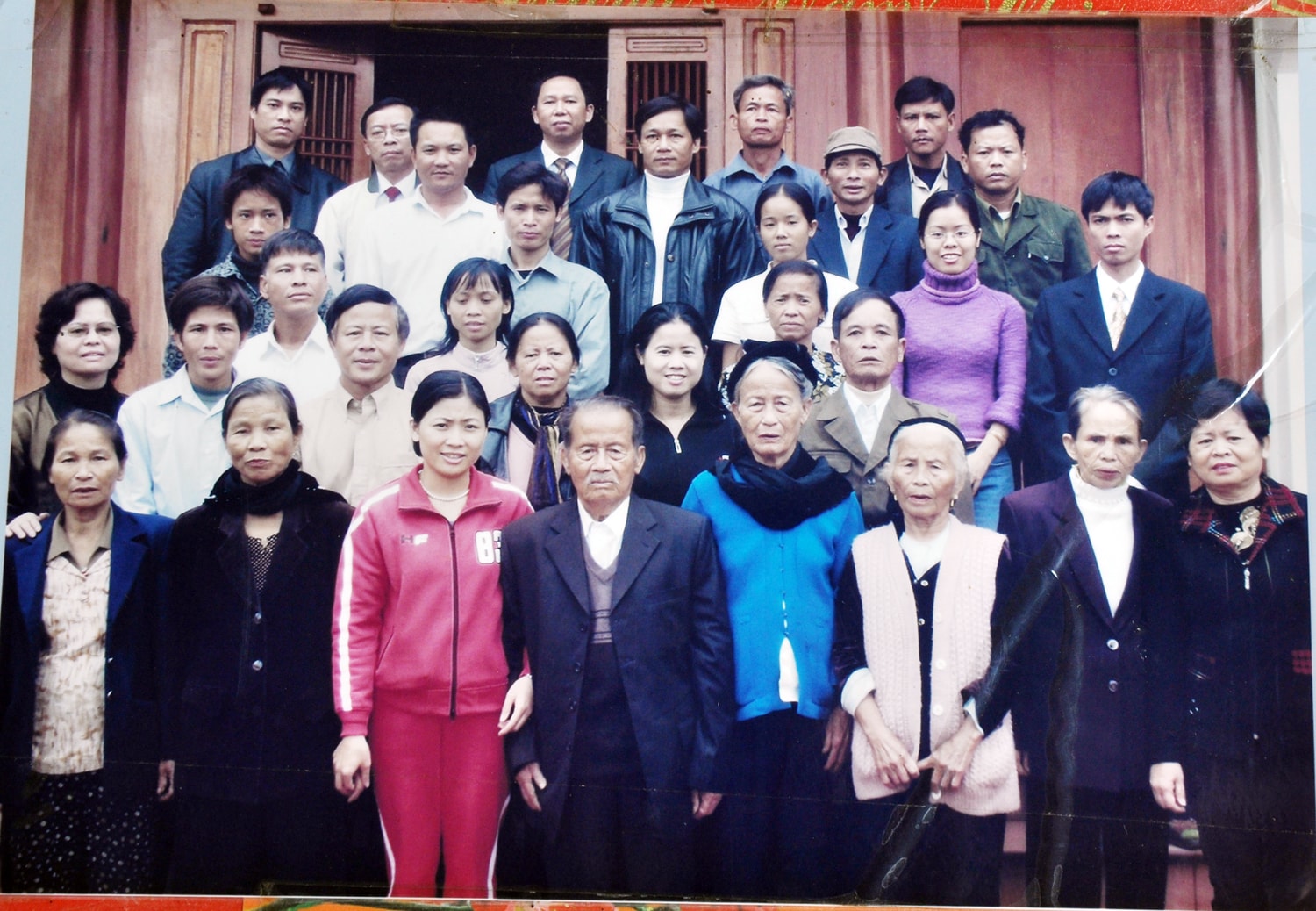The 102-year-old man's loyal devotion to the Party
(Baonghean.vn) - Having passed the threshold of one hundred years, nearly 80 years of Party membership, having had to live in a miserable prison, Mr. Phan To Duc is still quite lucid. His greatest happiness is to witness his children and grandchildren grow up and his homeland and country develop more and more.
The deepest impression when we visited the house of Mr. Phan To Duc (born 1916) in Kim Tien hamlet, Vo Liet commune (Thanh Chuong) was the newspapers neatly arranged in date and month order. "I was given Nghe An newspaper as a veteran revolutionary, the newspaper became my daily spiritual food, helping me grasp important information..." - he shared.
 |
| Mr. Phan To Duc recounts memories of the revolutionary struggle. Photo: Cong Kien |
Temporarily closing the newspaper, Mr. Phan To Duc began to tell about his life: “In the past, this land of Vo Liet was very poor, and was exploited by feudal lords with high taxes and duties. My family was also very poor, with many siblings, my parents worked hard and I did not have much education. But I must say that thanks to having a little knowledge, I had the opportunity to make friends, to receive new streams of thought through books and newspapers, so I was soon enlightened about revolutionary ideals.”
The old man still kept in his memory the fierce fighting atmosphere of 1930-1931 with the crowd of people flowing along the Lam River, hammer and sickle flags fluttering in the wind, marching to the government office to fight. At that time, only 14-15 years old, but the boy Phan To Duc had begun to realize the strength of the mass force and the leadership role of the Party organization, even though he had never met them before.
 |
| Every day, Mr. Phan To Duc reads the newspaper to update information. Photo: Cong Kien |
Growing up a little, the young man from Vo Liet was chosen by the progressives and assigned to contact progressive youths in the area to organize reading of books and newspapers, and propagate the revolutionary line to the people of all classes. Like a fish in a bowl that has been swimming out to a cool stream for a long time, Phan To Duc actively participated, gathered a large number of brothers and friends of young age and divided into three groups to read books, newspapers, documents, leaflets and then went to the villages to propagate the revolutionary line.
This job was extremely dangerous, because the village chiefs always had soldiers on duty and monitoring everywhere. If there was anything suspicious, they would report it to the district and the army would come to surround and arrest them. Fortunately, the people were always willing to protect and shelter them, because living in slavery with heavy taxes and duties, everyone wanted a change, a better life.
 |
| The notebook containing the poem “The Struggle in Prison”. Photo: Cong Kien |
With enthusiasm, passion, loyalty and a sense of responsibility, in August 1940, Phan To Duc was admitted to the Party and continued to be assigned to propaganda work. “The admission ceremony took place on the riverbank, surrounded by vast corn fields, with all the required members, the Party flag and I loudly recited the oath. Needless to say, the joy and honor, the pride but also the heavy responsibility, it has been nearly 80 years but the memories are still imprinted in my memory, those are moments I will never forget” – Mr. Duc confided.
Young party members increasingly realized the direction and prospects of the revolution, so they became more enthusiastic and active in their activities, integrating themselves into the mass movement to become more and more mature. From there, they promoted the establishment of a Party cell in Vo Liet, aiming to promote the revolutionary movement to develop more strongly in this rural area with a rich tradition of patriotism and struggle.
When the movement in Vo Liet began to develop rapidly, the majority of the people understood the revolutionary path and enlightenment, the Party cell decided to expand the scope of propaganda to other communes in the region. Party member Phan To Duc, in the role of a teacher, went to Quang Xa area (now Thanh Ha commune) to propagate the fighting path. Here, he took on the job of tutoring two children of a relatively well-off family. Whenever he had the opportunity, he went around the village, going to each house to organize readings of books and newspapers, mobilizing people to follow the revolution.
 |
| 100th birthday greeting card from President Truong Tan Sang to Mr. Phan To Duc in 2016. Photo: Cong Kien |
The number of people who came to listen to him talk and read books and newspapers increased day by day. There were nights when people gathered until 2am to listen to lectures on the revolutionary path outlined by patriot Nguyen Ai Quoc. This action was discovered by the local authorities and reported to their superiors. Phan To Duc was followed every step of the way. One day in July 1940, while having lunch with the host family, the head of Quang Xa village suddenly stopped by to ask some random questions, then soldiers suddenly came in and took Duc to the district office.
From Thanh Chuong district office, they took Mr. Phan To Duc to Rang station (now Thanh Phong commune) to torture and extract information about the organization. Here, he had to endure three extremely savage and inhumane beatings, the enemy used hammers and iron rods to hit the head, back, arms and legs of the staunch communist.
The third beating, the iron rod across the back made Mr. Duc fall to his knees, his back cracked, in extreme pain. Unable to get any information, they transferred him to Vinh prison and continued to endure the enemy's brutal beatings. In pain and humiliation, but the son of Vo Liet land refused to say a word, only saying one sentence: "I am a teacher, I don't know who is a communist."
 |
| The joy of reunion of Mr. Phan To Duc's extended family (family photo provided). |
In Vinh prison, Phan To Duc met loyal revolutionary soldiers of his homeland such as Tran Van Quang (later Senior Lieutenant General, Deputy Minister of National Defense) and Le Nam Thang (later Major General, Commander of Military Region 4). They were truly outstanding friends, comrades, and brothers, good at both theory and practical experience in fighting. They were the ones who helped Mr. Duc overcome the most painful moments so that his belief in tomorrow would always be strong.
After 6 months of detention, Mr. Phan To Duc was sentenced by the French colonial court to 12 years in prison and exiled to Buon Ma Thuot prison (Dak Lak) - a place used to detain and exile political prisoners and famous for its brutal torture. Despite being tortured and restrained to the point of suffocation, the iron shackles rarely leaving his skinny legs, and the bone-chilling cold nights without enough clothes and blankets, meals of moldy rice and rotten fish, Mr. Duc and his comrades still continued the struggle.
Cultural classes and revolutionary theory propaganda were still held, books and newspapers were secretly brought in, and struggles for improved meals and treatment of the sick broke out one after another, forcing the enemy to give in. During his days of exile in the scorching highlands, Mr. Phan To Duc had the opportunity to meet his fellow countrymen of the older generation, who had been exiled here several years before.
A fellow prisoner copied a poem written in 1931 by a communist prisoner in Kon Tum, which Mr. Duc still remembers and writes in a small notebook. The poem is about the struggle in prison, encouraging the spirit of struggle, with the following passage:“Stand up together in the face of death/Determined to sacrifice against the barbarians/How can we be at peace if we accept it like this/Expose the imperialists, dig out the livers of the mandarins/Determined to oppose the construction of Dacpet road/Even if our bones are broken and our flesh is rotten, it doesn't matter...”.
In the last days of August 1945, the whole country was seething with the general uprising movement to seize power, Buon Ma Thuot prison was liberated, joy burst out. “At that time, my brothers and I hugged each other and cried, cried with joy and happiness. Receiving the news that the government had been won back home, the people were extremely excited, I felt even more proud...” – Mr. Phan To Duc shared.
After the revolution succeeded, Mr. Phan To Duc returned to his hometown and took charge of the province's propaganda work until his retirement. Now that he is old, his children and grandchildren have all become successful, many of them have doctorates and masters degrees. His daily joy is reading the newspaper to update information about the changes and developments in his hometown and country.

